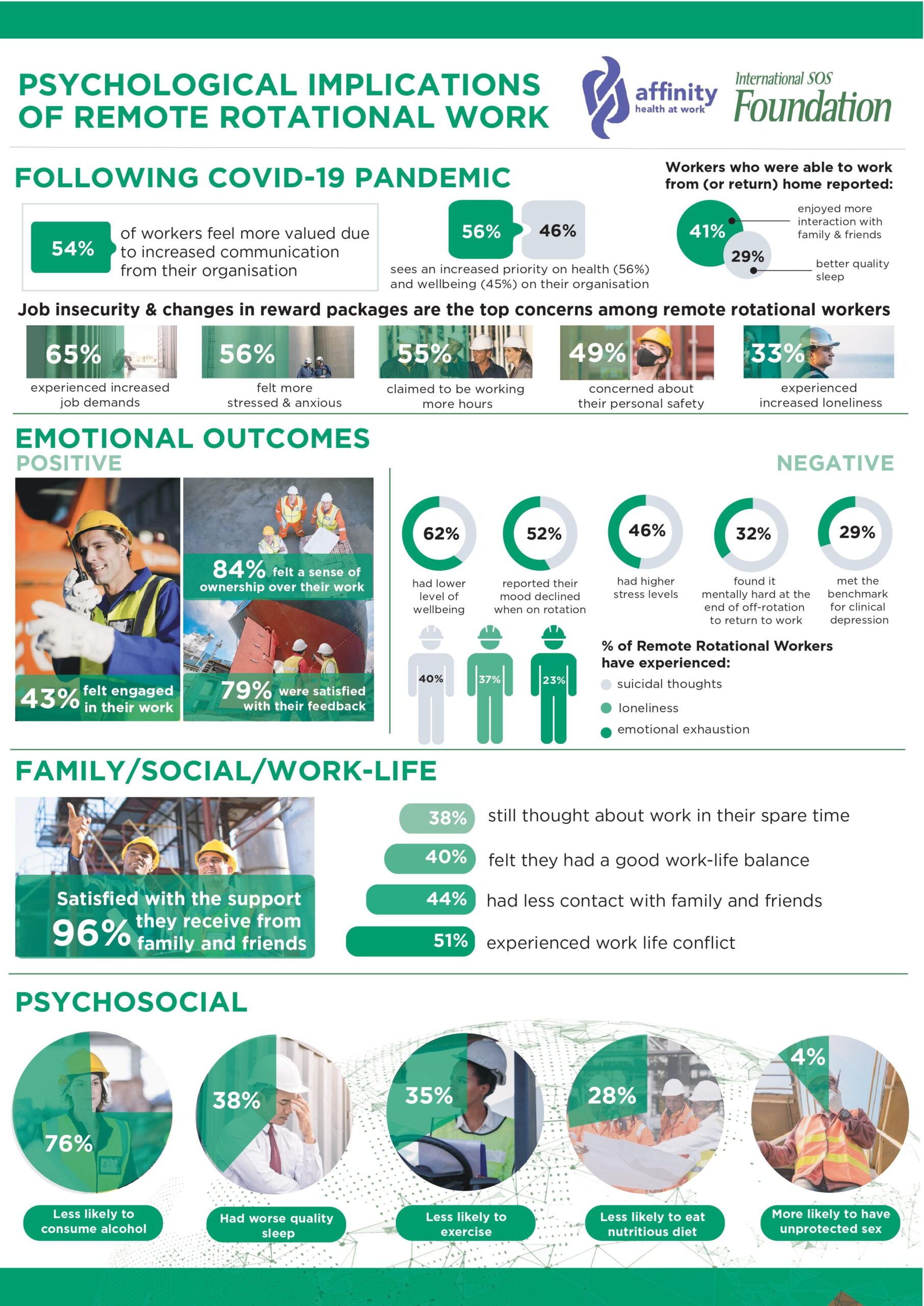Amid an increasing discussion on crew mental health, a new study by International SOS Foundation and Affinity Health at Work revealed that 40% of seafarers and offshore workers surveyed experienced suicidal thoughts on rotation some or all the time.
The global report ‘Mental Health and the Remote Rotational Workforce’, highlights evidence of the high level of suicidal thoughts, clinical depression, impacts on physical health (such as diet), and the impact of the COVID-19 pandemic on seafarers, with the latter factor having added increased stress on an already pressured working arrangement, according to the study.
[smlsubform prepend=”GET THE SAFETY4SEA IN YOUR INBOX!” showname=false emailtxt=”” emailholder=”Enter your email address” showsubmit=true submittxt=”Submit” jsthanks=false thankyou=”Thank you for subscribing to our mailing list”]
The survey was completed by a wide range of remote rotational workers across types of rotation, sectors, areas, and from a range of professional and cultural backgrounds. The respondents were split between mining, offshore and seafaring/maritime industries and were globally represented.
There is an urgent need for increased focus, understanding and strategies to mitigate mental ill-health and promote better mental health of the remote rotational workforce. This is highlighted in our survey, which uncovers significantly high levels of critical mental ill health issues, including suicidal thoughts and depression,
…commented Dr. Rodrigo Rodriguez-Fernandez, Medical Director Wellness and NCD’s, International SOS.
Key study findings:
- 40% of all respondents experienced suicidal thoughts on rotation some or all the time. Compared to the global average of 4-9%, this highlights the importance of recognising mental health resilience. Part of this includes implementing an overarching mental health strategy that focuses on prevention, which should include a way to monitoring and evaluate the successful execution of the strategy over time. Meanwhile, 1 in 5 are feeling suicidal all or most of the time.
- Nearly 1/3 (29%) met the benchmark for clinical depression whilst on-rotation. 52% felt that their mood declined, and their mental health suffered whilst on rotation. Potential health and safety risks, increased loss time injuries (LTIs) as well as financial and legal implications were highlighted as key issues from the research. Another main finding is that organizations are recommended to review flexible working policies and arrangements, offer on-site training for employees and develop programmes and resources to improve morale and work-life balance.
- 62% had worse mental health than would be the norm in a population. While off rotation, this remains at a high of 31% experiencing lower mental health than the general population.
- Over a third exercised less (35%) and experienced worse-quality sleep (38%) and over a quarter (28%) were less able to eat a nutritious diet whilst on rotation. The knock-on effect of poor physical health contributes to additional health and safety risks on site, reduced productivity as well as increased LTIs.
Evaluating existing health strategies and policies in partnership with a medical expert is recommended in order to ensure that necessary support structures are relevant to the local workforce and evidence based. Implementing a site wide wellbeing programme with an onsite wellness centre that equips employees will the resources and know-how to enable them to adopt healthy behaviours will not only result in a healthier workforce but in a sustainable business.
- COVID-19 increased the demands of their job (65%), their stress and anxiety levels (56%) and their working hours (55%). Nearly half were also more concerned for their personal safety (49%). The pandemic has exacerbated potential health and safety risks, challenged productivity levels and increased the risks of accidents on site.
Organisations should review their flexible working policies to ensure a suitable work-life balance can be achieved and employees receive the appropriate level of care during these unprecedented times. Ensuring mental health resilience will continue to be challenged as the pandemic remains.,
…the report reads.

Burn Out
The study also exposed that almost a quarter (23%) of the remote rotational workers surveyed experienced emotional exhaustion on a weekly basis. 46% experienced higher stress levels while on rotation and over half (57%) were not engaged in their work. 23% reported that they received no psychological support from their employers.
We would expect burn out to be between 2-13% in the general population, so the almost quarter that we see from the survey is particularly high…Remote rotational work may come with the perks of higher pay, but with its propensity to be isolating at the best of times. On and offshore, working pressures and varying shift patterns also add their weight. And this is not to mention the impact of the current pandemic, which has seen may remote workers unexpectedly away from family and friend networks for longer than anticipated,
…added Dr Rachel Lewis.
Impacts of the COVID-19 pandemic
- 65% experienced increased job demands.
- 56% increased working hours stress, anxiety
- 49% concerned for personal safety (before pandemic?)
- 1/3 became increasingly lonely
- 23% had more negative physical symptoms (such as headaches and stomach issues)
On the flip side, the majority of respondents felt that their health and safety was prioritized. They report a strong sense of community and support among co-workers and from managers. Many also felt that they could share their mental health concerns with colleagues.































































